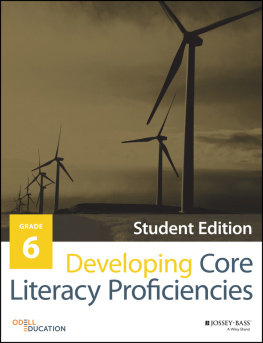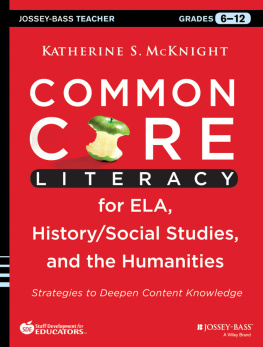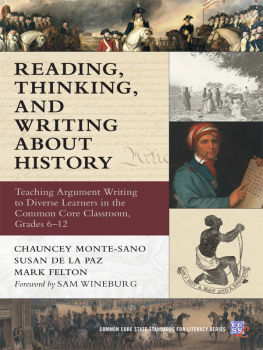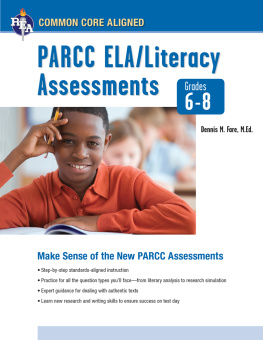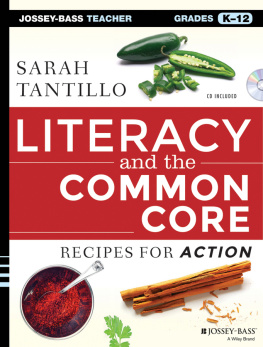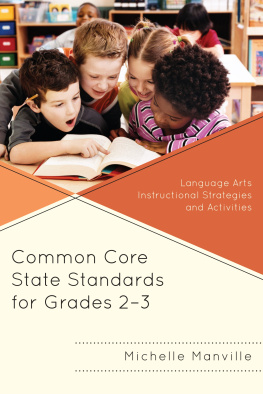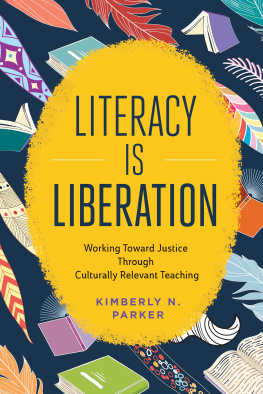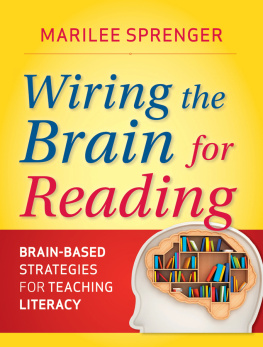
Copyright 2016 by Odell Education. All rights reserved.
Published by JosseyBass
A Wiley Brand
One Montgomery Street, Suite 1000, San Francisco, CA 941044594www.josseybass.com
No part of this publication may be reproduced, stored in a retrieval system, or transmitted in any form or by any means, electronic, mechanical, photocopying, recording, scanning, or otherwise, except as permitted under Section 107 or 108 of the 1976 United States Copyright Act, without either the prior written permission of the publisher, or authorization through payment of the appropriate percopy fee to the Copyright Clearance Center, Inc., 222 Rosewood Drive, Danvers, MA 01923, 9787508400, fax 9786468600, or on the Web at www.copyright.com. Requests to the publisher for permission should be addressed to the Permissions Department, John Wiley & Sons, Inc., 111 River Street, Hoboken, NJ 07030, 2017486011, fax 2017486008, or online at www.wiley.com/go/permissions.
Permission is given for individual classroom teachers to reproduce the pages and illustrations for classroom use. Reproduction of these materials for an entire school system is strictly forbidden.
Limit of Liability/Disclaimer of Warranty: While the publisher and author have used their best efforts in preparing this book, they make no representations or warranties with respect to the accuracy or completeness of the contents of this book and specifically disclaim any implied warranties of merchantability or fitness for a particular purpose. No warranty may be created or extended by sales representatives or written sales materials. The advice and strategies contained herein may not be suitable for your situation. You should consult with a professional where appropriate. Neither the publisher nor author shall be liable for any loss of profit or any other commercial damages, including but not limited to special, incidental, consequential, or other damages. Readers should be aware that Internet Web sites offered as citations and/or sources for further information may have changed or disappeared between the time this was written and when it is read.
JosseyBass books and products are available through most bookstores. To contact JosseyBass directly call our Customer Care Department within the U.S. at 8009567739, outside the U.S. at 3175723986, or fax 3175724002.
Wiley publishes in a variety of print and electronic formats and by printondemand. Some material included with standard print versions of this book may not be included in ebooks or in printondemand. If this book refers to media such as a CD or DVD that is not included in the version you purchased, you may download this material at www.wiley.com/go/coreliteracy (use the following password: odell2016). For more information about Wiley products, visit www.wiley.com.
Library of Congress CataloginginPublication Data
Names: Odell Education, author.
Title: Developing core literacy proficiencies. Grade 6 / Odell Education.
Description: Student edition. | San Francisco, CA : JosseyBass, 2016.
Identifiers: LCCN 2016002271 (print) | LCCN 2016012614 (ebook) |
ISBN 9781119192787 (paperback) | ISBN 9781119192800 (pdf) | ISBN 9781119192794 (epub)
Subjects: LCSH: Language arts (Elementary)CurriculaUnited States. |
Common Core State Standards (Education)
Classification: LCC LB1576 .O344 2016b (print) | LCC LB1576 (ebook) | DDC
372.6dc23
LC record available at http://lccn.loc.gov/2016002271
Cover Design: Wiley
Cover Image: Danae Olaso/EyeEm/Getty Images, Inc.
ACKNOWLEDGMENTS
Project director: Stephanie Smythe
Primary program designers:
- Rick Dills, EdD
- Judson Odell
- Ioana Radoi
- Daniel Fennessy
Curriculum consultant: Nemeesha Brown
Contributing text specialist: Rosemarie Heinegg, PhD
Unit developersTexts, notes, and questions:
- Reading Closely for Textual Details: The wolf you feed: Rick Dills, EdD
- Making EvidenceBased Claims: Connecting the Dots: Rick Dills, EdD
- Researching to Deepen Understanding: Prehistoric Cave Art: Rosemarie Heinegg, PhD, and Luke Bauer
- Building EvidenceBased Arguments: Energy Crossroads: Daniel Fennessy and Rick Dills, EdD
We are grateful for feedback we received on early versions of units from Achieve's EQuIP Review Process, under the direction of Christine Tell, Alissa Peltzman, and Cristina Marks.
We are also grateful for the students and teachers of the Bay Shore Schools who collaborated with us to pilot the curriculum. Thanks especially to LaQuita Outlaw, Elizabeth Galarza, Caitlin Moreira, and Jen Ritter (who personally renamed the Supporting EvidenceBased Claims Tool).
We are especially grateful for New York State and the Regents Research Fund for funding the development of the earlier Open Educational Resource version of this curriculum. Without the support we received from Kristen Huff, David Abel, and Kate Gerson, none of this work would have been possible.
INTRODUCTION TO THE CORE LITERACY PROFICIENCIES: BECOMING A LITERATE PERSON
Literacy is the ability to use printed and written information to function in society, to achieve one's goals, and to develop one's knowledge and potential.
Definition from the National Assessment of Adult Literacy
Becoming a Literate Person: Your school and teachers are trying to help you succeed in lifeand to be the best you can be at whatever you choose to do. One of the ways they are doing this is by developing your literacybut what do we mean when we talk about your literacy? A dictionary might simply tell us that developing literacy means building your skills as a reader, thinker, and writerbut it also might tell us that literacy is knowledge in an area of learning that is important to you. In addition, being literate involves ways of thinking and doing thingshabitsthat a person develops over time.
Being a literate person is even more important todayin our computer-driven worldthan it was in the past, no matter what you want to do:
- Go to college and become a scientist
- Be a designer, artist, musician, or chef
- Own your own business
- Develop computer applications or video games
- Work in an industry or a construction field
- Seek a career in the military
- Just want to keep up with the news of the world
You will need to be literate whatever path in school and life you choose to follow. A recent study of the reading challenges faced by people in the United States found out that the textbooks students see in their first two years of college are much more challenging than the ones they use in high schoolone reason so many new college students struggle. But the study also found that technical manuals, informational websites, and even newspapers demand a high level of reading and thinking skills as well as specialized knowledge and strategic habitsthey demand literacy.
Core Literacy Proficiencies: The learning experiences you will discover in the Odell Education Program are designed to help you take control of your own literacy development and build the skills, knowledge, and habits you will need to be successful in life. They are also designed to excite your imagination and engage you in activities that are interesting and challenging.
The learning activities you will encounter will help you develop four key Core Literacy Proficiencies. What do we mean by this term? We've already discussed the importance of literacy. Core suggests that what you will be learning is at the centerof your literacy development, your overall success in school, and your future life. The word
Next page
